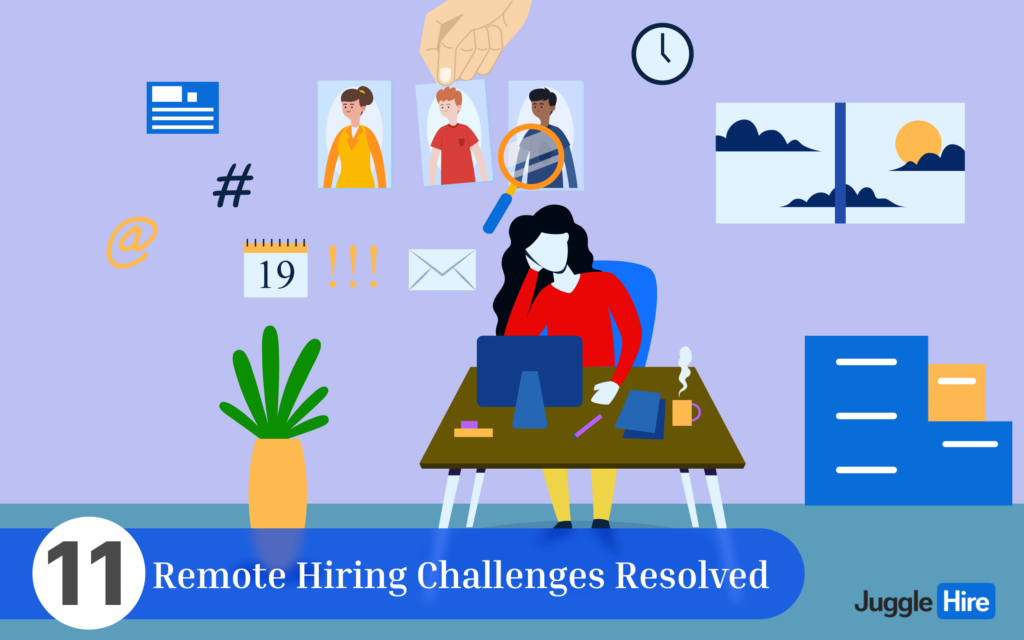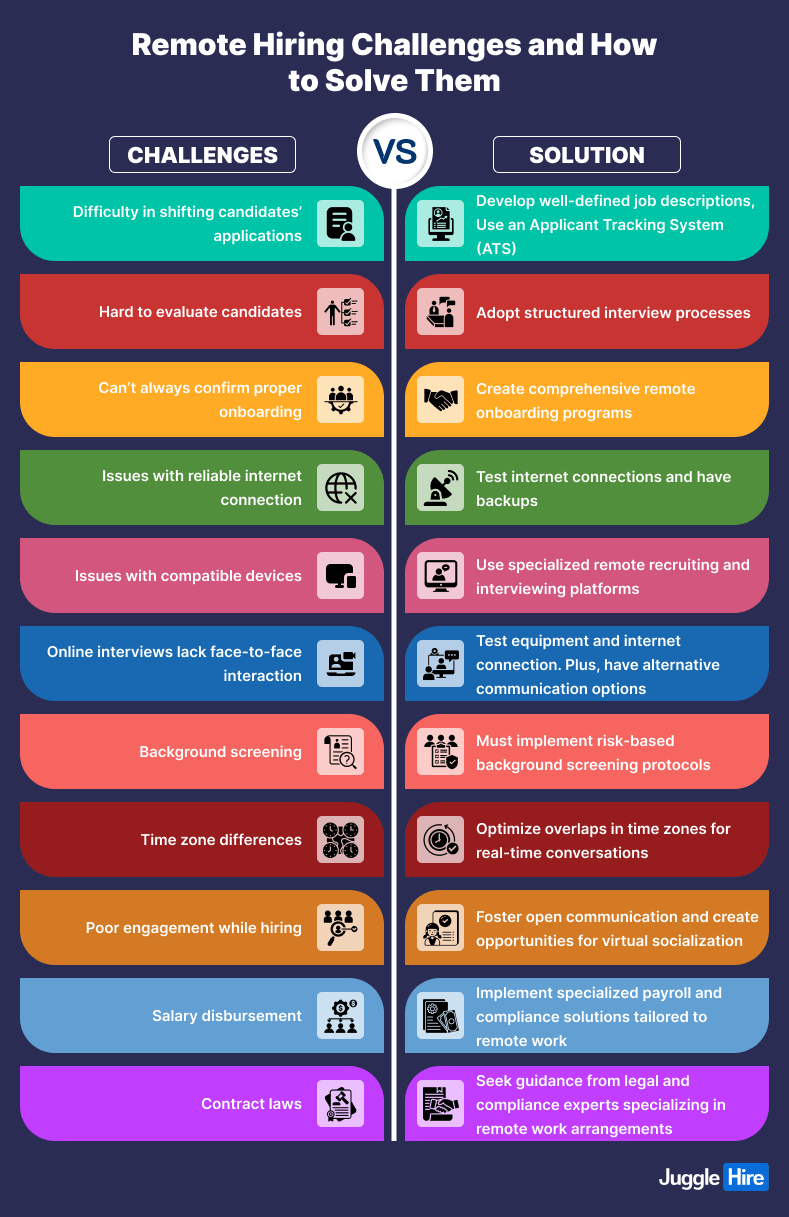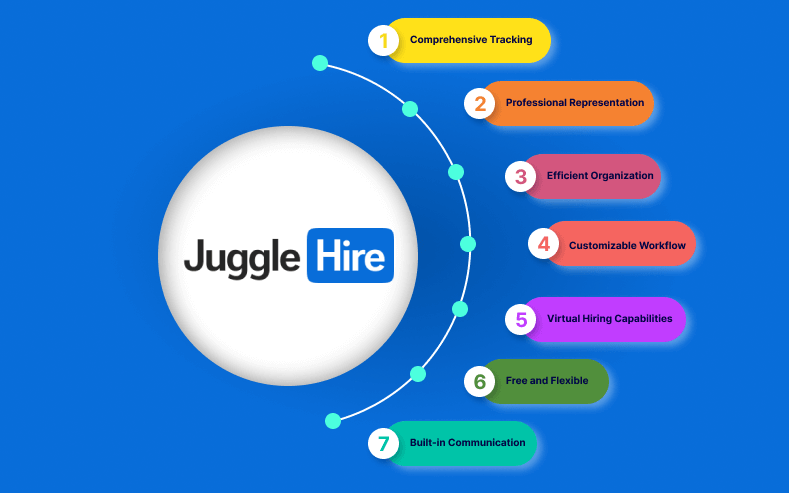From Hurdles to Triumph: 11 Remote Hiring Challenges Resolved

Like it or not, the world has been reshaped by the pandemic. Hence, remote work has become a norm rather than an exception.
Before the global shift, remote work was a rarity, with less than 6% of people experiencing its flexibility. However, as circumstances compelled people to work from home, they discovered various perks of this trend. Yet, amidst these newfound benefits, companies encountered a myriad of remote hiring challenges.
On that note, we will highlight the 11 common hiring challenges in remote recruitment. At the same time, we will provide innovative solutions to ensure smooth operations within a remote work culture.
11 Remote Hiring Challenges and How to Solve Them

Remote hiring presents its own set of unique challenges for hiring managers. These are always something about onboarding difficulties, evaluating candidates, and so on. It requires careful planning and innovative solutions to solve these remote recruitment challenges.
Here are the 11 most common remote hiring challenges and strategies to tackle them:
- Difficulty in Sifting Candidate’s Applications
- Hard to Evaluate Candidates
- Can’t Always Confirm Proper Onboarding
- Issues with Reliable Internet Connection
- Issues with Compatible Devices
- Online Interviews Lack Face-to-Face Interaction
- Background Screening
- Time Zone Differences
- Poor Engagement While Hiring
- Salary Disbursement
- Contract Laws
Now let’s get into the details:
01. Difficulty in Sifting Candidate’s Applications
In recent years, there has been a surge in remote work opportunities. This tendency has led to a substantial increase in the number of job applications received by companies. This influx of resumes poses a significant challenge for hiring managers.
They have to sift through tons of applications to identify the most suitable candidates for remote positions. With limited time and resources, it becomes increasingly difficult to efficiently screen and shortlist candidates. It consumes valuable time and resources, slowing down the recruitment timeline. Potentially, this can delay critical hiring decisions.
Cause of this Challenge
This challenge arises due to the exponential growth in remote work opportunities. This has fueled a surge in job seekers applying for remote positions. Additionally, the lack of standardized criteria for remote job requirements exacerbates the difficulty in efficiently sifting through candidate applications. Also, it arises because of the absence of tailored screening processes.
Solution
To address this challenge, hiring managers must implement strategies to streamline the application screening process. One solution is to develop well-defined job descriptions. They must outline specific qualifications and remote work expectations in the job descriptions. This will filter out unqualified applicants.
Moreover, leveraging technology such as AI-based Applicant Tracking Systems (ATS) can automate resume screening. As a result, hiring managers can focus their attention on evaluating candidates who meet the specified criteria.
02. Hard to Evaluate Candidates
Assessing candidates remotely poses unique challenges for hiring managers. In particular, remote hiring challenges occur in accurately evaluating both hard and soft skills without the benefit of in-person interactions.
Remote recruiters may struggle to gauge candidates’ suitability for a role. They may not assess their qualifications effectively, which can lead to uncertainties in hiring decisions. For instance, they may overlook qualified candidates or hire individuals who may not be the best fit for the role.
Sometimes, there can be a lack of real-time feedback and observations during remote interviews. This may result in misjudgments of candidates’ capabilities and potential for success in the role.
Cause of this Challenge
This remote hiring challenge stems from the limitations of virtual interactions in capturing various aspects of the candidate. These can be –
- Personalities of the candidates
- Communication styles
- Working habits
Moreover, the absence of physical cues and environmental context might be present while hiring remote employees. If that’s the case, hiring managers won’t be able to assess candidates’ soft skills and cultural fit accurately.
Solution
To address such hiring issues, hiring managers should adopt structured interview processes. They can utilize technology to facilitate effective candidate evaluations remotely. Prior to interviews, recruiters should clearly define the skills and competencies.
Recruiters can also utilize question banks, standardized assessments, and role-playing scenarios. These can provide valuable insights into candidates’ capabilities and suitability for the role.
If required, hiring managers can organize test projects, candidate evaluation forms, or skills surveys. This way, they can evaluate candidates’ practical skills and problem-solving abilities.
For more insights, please check –
15 Killer Recruitment Tips for Recruiters
03. Can’t Always Confirm Proper Onboarding
New employees may struggle to acclimate to their roles and company culture without the traditional in-person interactions. This may present unique remote hiring challenges. Often, hiring managers face difficulties in ensuring that new hires receive proper onboarding. This can hinder their ability to integrate effectively into the team and perform at their full potential.
Inadequate onboarding processes can lead to the following disadvantages –
- Decreased productivity
- Lower job satisfaction
- Higher turnover rates
Without proper guidance and support during the onboarding period, new hires may experience feelings of isolation. Therefore, they can be confused about their roles and responsibilities. Ultimately, they will feel a lack of connection to the company culture.
Cause of this Challenge
The inability to confirm proper onboarding stems from the absence of in-person interactions. Additionally, inadequate planning and resources dedicated to remote onboarding contribute to this challenge.
Proper onboarding stems are essential for facilitating effective communication and training. These can build effective relationships between new hires and their colleagues.
Solution
To address this remote hiring challenge, hiring managers must prioritize creating comprehensive remote onboarding programs. In this case, they should tailor these programs according to the needs of remote employees. This includes the following –
- Establishing clear communication channels
- Providing access to relevant resources and training materials
- Assigning mentors or buddy systems to support new hires during their transition
- Leveraging technologies for remote workforce
- Using collaboration tools for remote onboarding processes
Want to more on this? Check out –
Remote Hiring Tips: How To Attract, Hire and Retain Remote Employees
04. Issues with Reliable Internet Connection

One of the significant challenges faced in remote hiring is the issue of a reliable internet connection. In many remote work scenarios, both employers and candidates rely heavily on internet connectivity. However, unreliable internet connections can disrupt these processes.
Candidates may experience frustration and anxiety when their interviews are interrupted due to poor connectivity. It can affect their overall impression of the hiring process and the company. Employers, on the other hand, may struggle to effectively evaluate candidates or conduct virtual interviews. An unreliable internet connection can lead to hiring delays and failure to find top talent.
Cause of this Challenge
An unreliable internet connection can occur due to various factors. The major reasons are –
- Infrastructure limitations
- Technical issues with Internet service providers
- Environmental factors affecting signal strength
In remote areas or regions with inadequate infrastructure, access to high-speed internet may be limited. This can create connectivity issues. Moreover, fluctuations in internet bandwidth or service disruptions can occur unexpectedly, further exacerbating the problem.
Solution
Companies can implement several strategies to address this remote hiring challenge. Both the candidates and interviewers can have backup internet connections. They can go for alternative communication methods available in case of disruptions. Before scheduled interviews, both parties should test their internet connection.
Moreover, recruiters can offer flexible scheduling options to accommodate candidates experiencing connectivity issues. They can employ offline tools or downloadable resources for candidate evaluation. For instance, offline candidate evaluation forms can play a vital role in mitigating the impact of internet disruptions.
05. Issues with Compatible Devices
Technical compatibility issues can arise during remote recruiting and interviewing processes. This can disrupt communication and hinder candidate assessments. Apart from an internet connection, not all candidates have access to the necessary technology. Therefore, potential disruptions and inconsistencies will arise during the interview or working hours.
Compatibility issues with devices can result in delays, misunderstandings, and frustrations during remote interviews. Poor video quality, audio glitches, and connectivity issues can impede effective communication. Furthermore, technical difficulties can create bias against candidates who face challenges due to their technical limitations.
Cause of this Challenge
The root cause of compatibility issues lies in the diverse technological environments of remote candidates. This can be connected with –
- Variations in internet connectivity
- Device capabilities
- Software compatibility
Moreover, both candidates and hiring managers should not rely on generic video conferencing tools without adequate preparation. This will exacerbate the risk of technical disruptions during remote interviews.
Solution
To mitigate issues with compatible devices, hiring managers should proactively address technical considerations. They should adopt specialized remote recruiting and interviewing platforms designed to minimize compatibility issues.
Prior to interviews, candidates should receive clear instructions on the preferred remote hiring software or platform to ensure compatibility. If required, employers should provide necessary devices (such as computers, laptops, mobile phones, etc) if the worker is having financial struggles.
Companies can go for permanent device giveaway policies. They can permanently provide compatible devices to employees, after a certain period of working (like 2 or 3 years).
06. Online Interviews Lack Face-to-Face Interaction
Conducting remote interviews presents significant challenges due to the absence of face-to-face interaction. While internet access is widespread, not everyone has high-speed connectivity. As a result, disruptions and frustrations may occur during online interviews.
Not to mention technical difficulties during online interviews. Internet bandwidth issues, screen freezes, and audio disruptions may suddenly happen during a virtual interview. These can lead to misunderstandings and incorrect responses from candidates.
These recruitment challenges can undermine the effectiveness of the interview process. On top of that, signs of awkwardness and nervousness may arise during remote interviewing. This can exacerbate anxiety for both parties.
Cause of this Challenge
Mainly, the reliance on technology causes these remote hiring challenges. Also, the inherent limitations of virtual communication play a vital role. The following attributes contribute to the difficulty of conducting seamless online interviews –
- Variations in internet connectivity
- Technical issues with web conferencing tools
- Cultural differences
In addition, the lack of physical presence and non-verbal cues makes it challenging to establish effective relationships. So, recruiters can’t effectively assess candidates’ suitability for the role.
Solution
To address such challenges in hiring, it’s essential to proactively prepare and mitigate potential technical issues. Implementing a backup plan in case of connectivity issues or technical glitches is crucial.
Moreover, both parties should conduct thorough equipment and internet connection tests before remote interviews. They should have alternative communication options available. If necessary, recruiters can reschedule interviews and provide candidates with clear instructions. This will ensure a positive interview experience.
07. Background Screening

The shift to remote work introduces new risks associated with background screening. Candidates may provide fraudulent information about their education and work history. You should know that instances of degree and employment history fraud are prevalent.
Hiring individuals with fabricated credentials or undisclosed criminal records can jeopardize organizational integrity. This can expose the company to legal liabilities. Employing individuals with misrepresented backgrounds may result in –
- Decreased productivity
- Conflicts in the workplace
- Potential data breaches
- Trust issues between clients and stakeholders
Cause of this Challenge
Candidates may provide false or misleading information due to the lack of in-person verification. That is when this remote hiring challenge will arise. Employers may face a prevalence of degree and employment history fraud. Plus, there might be complexities in verifying credentials in the gig economy. Together, this can exacerbate the difficulty of conducting comprehensive background checks.
Solution
To minimize or solve this challenge in hiring, organizations must invest in robust screening processes. They can also implement risk-based background screening protocols tailored to the specific needs of remote positions. This step can identify and mitigate potential fraud risks effectively.
In addition, recruiters can use advanced background screening software. This can provide instant access to comprehensive background information. This will enhance efficiency and accuracy in the screening process.
08. Time Zone Differences
In this era, hiring managers can access a diverse pool of candidates from various geographic locations. It is all thanks to the global nature of talent acquisition. However, this geographical diversity introduces the challenge of time zone differences. This can complicate scheduling interviews and conducting real-time assessments.
Time zone variances can result in the following issues –
- Scheduling conflicts
- Delayed responses
- Missed opportunities for real-time interactions
- Prolonged recruitment timelines
- Increased administrative burden
- Disturbed flow of communication
- Ineffective collaboration
- Potential frustration for both hiring managers and candidates
Cause of this Challenge
Candidates and hiring managers may be located in different regions with distinct time zones. As a result, there can be a remote hiring challenge due to time zone differences. It is becoming challenging to coordinate interview schedules.
Furthermore, variations in daylight saving time and cultural preferences increase the complexities of managing time zone disparities.
Solution
To mitigate this challenge, hiring managers should leverage scheduling software and communication tools (such as JuggleHire). This step can foster coordination across different time zones. Utilizing an all-in-one hiring platform like JuggleHire can reduce the risk of miscommunication and scheduling conflicts.
Moreover, recruiters can optimize overlaps in time zones for real-time conversations whenever possible. In cases where scheduling conflicts arise, they can employ remote recruiting software with pre-recorded responses. This way, hiring teams can still make informed decisions despite time zone disparities.
09. Poor Engagement While Hiring
Hiring remote employees can be challenging due to the absence of in-person interactions. Plus, both parties may feel inherent differences in communication dynamics in virtual environments. This will hinder engagement with remote candidates.
On the other side, remote candidates may struggle to integrate seamlessly into remote teams. Therefore, it will be difficult to build rapport and establish connections with colleagues. Candidates who feel disconnected or isolated may lose interest in pursuing opportunities with the company.
What’s more, candidates may feel self-conscious or uncomfortable on camera. This has an impact on their ability to express themselves naturally. It will seem like they are poorly engaging during virtual interactions.
Cause of this Challenge
A lack of opportunities for organic socialization in virtual environments is the main cause of this remote hiring challenge. Some candidates may feel discomfort and self-consciousness since they can’t express themselves authentically on camera.
The challenge of poor engagement arises when it becomes challenging to make face-to-face interactions. Additionally, a lack of trust due to poor relationships will contribute to more challenges after hiring.
Solution
To reduce the impact of this hiring problem, companies can foster open communication and create opportunities for virtual socialization. They can use better communication tools to establish a sense of connection and rapport with remote candidates. Ultimately, this will create more meaningful interactions.
On top of that, employers can schedule brief meetings with new employees and team members. New remote hires will feel integrated into the team more quickly through these informal introductions.
To make it more friendly and enjoyable, a company can implement virtual team-building events. For example, employers can organize multiplayer video games or virtual coffee meetings from time to time. As a result, remote candidates can connect with colleagues easily and foster a sense of belonging within the organization.
You Might be Interested In –
15 Real-Life Scenarios to Manage a Remote Team (+ Solutions)
10. Salary Disbursement
Proper salary disbursement is crucial for maintaining employee satisfaction and retention. Yet, remote salary processing presents complex challenges for businesses. Inefficient salary disbursement processes can lead to –
- Delayed payments
- Inaccuracies in salary calculations
- Compliance violations
- Frustration and financial uncertainty
Economic anxiety among remote workers may increase, particularly during periods of global uncertainty such as the COVID-19 pandemic. Moreover, errors in salary disbursement can damage trust and credibility within the workforce.
Cause of this Challenge
A disbursement in salary may emerge from the intricacies of cross-border payroll management. Some factors contribute to these hiring challenges, such as –
- Varying tax laws across different countries
- International money transfers
- Currency conversions
- Accurate salary calculations
- Variations in invoicing
- International banking protocols
The above can complicate the salary disbursement process for remote employees, though there can be other reasons. For instance, the reliance on manual processes and outdated payroll systems exacerbates such hiring challenges.
Solution
Businesses can implement specialized payroll and compliance solutions tailored to remote work environments. Implementing remote payroll software streamlines salary processing. This will ensure compliance with international tax regulations and labor laws. Advanced payroll platforms offer features, such as –
- Automated salary calculations
- Integrated invoicing
- Secure international money transfers
- Reduce the burden on HR personnel
- Minimize the risk of errors
To top it off, partnering with remote payroll and compliance teams provides expert support and guidance. Therefore, employers can handle the complexities of remote salary management effectively.
11. Contract Laws

Drafting legal contracts for remote employees involves navigating complex labor laws. Plus, they must ensure compliance with regulations across different countries. Hence, it can be a daunting task for hiring managers and employers.
The necessity to adhere to diverse legal frameworks adds layers of complexity to the contractual process. Therefore, the hiring process becomes time-consuming and labor-intensive. Failure to address contract law requirements can expose remote companies to legal risks and liabilities.
Cause of this Challenge
Such hiring issues can arise from the legal intricacies of remote work arrangements. Failing to comply with labor laws in multiple jurisdictions is another reason for such remote hiring challenges.
What’s more! The lack of familiarity with international contract laws and the intricacies of remote work arrangements further compound the challenges. It complicates the process of ensuring legal compliance. So, both hiring managers and remote candidates can lose their interests.
Solution
To handle this problem, employers should seek guidance from legal and compliance experts specializing in remote work arrangements. There are professionals well-versed in international labor laws and remote employment regulations. Collaborating with them will ensure that contracts are drafted accurately and comply with legal requirements.
Moreover, employers can utilize standardized contract templates that can be customized for each prospective candidate’s needs. This will streamline the contractual process and reduce the risk of errors or omissions. Also, they must share important contractual documents with remote employees. In that case, they can use solutions (like JuggleHire) for document management and communication.
Should You Go for Remote Hiring?

As restrictions eased, the allure of remote work persisted. Today, nearly 60% of the workforce continues to embrace remote work. With that, a staggering 87% expressed a desire to maintain this arrangement given the opportunity.
Remote recruiting is here to stay, and it brings benefits for both companies and job seekers. Let’s break down why you should consider jumping on the remote hiring bandwagon:
1. More Options
With remote hiring, you’re not limited to just one geographic area. You can cast your net wider and find talented candidates in different cities, states, or even countries. Similarly, job seekers have the freedom to explore opportunities beyond their local area.
2. Increase Productivity
Advanced recruitment software and remote recruiting tools streamline the hiring process. You can screen, interview, and hire candidates more efficiently using video conferencing software. Therefore, you can connect face-to-face with more qualified applicants. This boosts productivity and ensures you get the best talent on board quickly.
3. Save Time
Gone are the days of coordinating travel or organizing in-person meetings for hiring teams. Remote hiring saves time by eliminating the need for physical gatherings. With the right technology, scheduling becomes easier. Plus, candidates are less likely to drop out of the hiring process. This means you can retain top talent and onboard them faster.
4. More Flexibility
Remote hiring offers flexibility for both employers and candidates. Connecting with prospective hires is simpler when all you need is a stable internet connection. So, say goodbye to risky commutes, time zone clashes, and scheduling conflicts. Candidates can fit interviews into their schedules without disrupting their existing commitments.
5. Save Money
Remote recruiting helps cut down on travel expenses associated with traditional hiring methods. By screening more applicants remotely, you can find the right people for the job. So, you can avoid costly hiring mistakes.
How Can JuggleHire Solve Remote Hiring Challenges

Who doesn’t want to simplify your hiring process, especially when it comes to remote hiring? Let JuggleHire be your ultimate solution for all remote hiring challenges. Here’s how JuggleHire can tackle those pesky remote hiring challenges:
i) Comprehensive Tracking
No more lost candidates in the sea of applications. JuggleHire’s thorough history tracking ensures you can trace each candidate’s journey from start to finish. It will guarantee no detail goes unnoticed.
ii) Professional Representation
Craft job postings that shine. With JuggleHire’s tools, you can create polished and captivating listings. It gives you better chances to attract top talent and showcase your professionalism.
iii) Efficient Organization
No more headache of sorting through countless resumes. JuggleHire features streamlined candidate reviews. It allows you to assess applicants quickly and make informed decisions in record time.
iv) Customizable Workflow
Tailor your hiring process to fit your needs perfectly. JuggleHire lets you create a workflow that works for you. It will make sure every step of the recruitment process is optimized for efficiency.
v) Virtual Hiring Capabilities
What is a virtual interview? It is the first step toward hiring the ideal candidate. In this regard, take your hiring game to the next level with JuggleHire’s virtual capabilities. Hire from anywhere, anytime, and boost your productivity like never before.
vi) Free and Flexible
Get started with JuggleHire for free and upgrade seamlessly as your hiring needs grow. Plus, enjoy the flexibility of customizing application forms to capture the information you need.
vii) Built-in Communication
Stay connected with candidates effortlessly. JuggleHire’s communication features come with ready-made templates for every stage of the hiring process. So, you can keep candidates informed and engaged without the hassle.
JuggleHire takes the hassle out of remote hiring. It makes it easier than ever to build your dream team, no matter where they are.
Wrapping up the Remote Hiring Challenges
As remote work continues to shape the future of employment, meeting these remote hiring challenges head-on is essential for organizational success.
With the right approach, these challenges can be effectively addressed. So, embracing the above best practices is crucial.
This will empower hiring managers to navigate remote hiring challenges with confidence and efficiency. Ultimately, this will foster a robust and thriving remote workforce.
